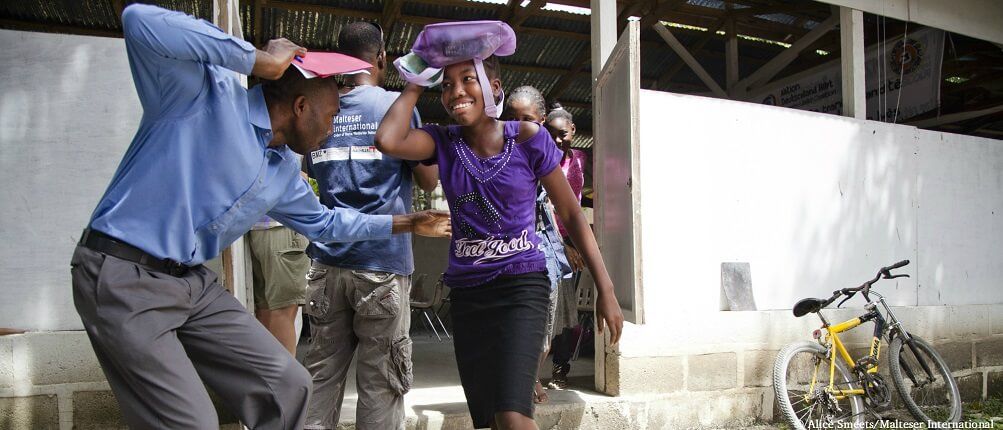
Increasing community resilience in the slums
The people living in the Cité Soleil – one of the largest urban slums in the Western hemisphere, with more than 250,000 residents – are caught in a daily struggle for survival. To suppress their hunger, some will even eat cakes made of mud and salt. There aren’t enough toilets – neither public nor at home – and there’s no proper sewage system, so most waste is out in the open. Many residents don’t know about the importance of hygiene, so diseases are easily spread.
Even before the 2010 earthquake, the situation in this Port-au-Prince neighborhood was precarious at best. And despite the repeated floods caused by storms and hurricanes since then, most people still don’t know how to prepare for disasters.
The Youth Union for the Development of the Commune of Cité Soleil (UJECOCIS) and other local organizations have taken the initiative to change this situation through volunteer work. But often, they have no expertise in the administration and implementation of projects. To enhance the community’s capacities for sustainable self-help, Malteser International will improve the technical and management skills of four selected partner organizations. Together, they will improve sanitation and prepare the population for disasters, so the living conditions in Cité Soleil are healthier and more dignified in the long run.
Following a project for cholera prevention in 17 camps in the Port-au-Prince urban area, Malteser International is now focusing on the extremely poor slum Cité Soleil, which is part of Port-au-Prince. The organization works with local movements that want to improve their living conditions through grassroots efforts. In a first project which was completed in January 2013, school latrines were rehabilitated in 16 schools and school brigades were trained for future disasters. The current project builds upon these efforts. In the long run, the local partners will take over the responsibility for carrying on the activities which are currently being initiated.
In Cité Soleil, the population lives in large part below the poverty line and earns below-minimum wages through casual daily labor. The general sanitary situation is precarious at best, the access to latrines is not sufficient and the lack of hygiene awareness leads to a lot of trash in the streets. This trash often obstructs the open sewers and leads to huge floods, which in turn bring the waste back into the houses.
- Professionalization of four local organizations in project management and organizational structure
- Development of a volunteer structure that will raise awareness within the population about good hygiene behavior, remove the waste and clean the sewers
- Better prepare the population for future disasters by raising awareness of the risks and teaching simple preparedness measures on the household level with a special focus on the inclusion of people with disabilities
- Prepare children in six schools for future disasters by raising awareness of the risks and the training and equipment of school brigades in evacuation and first aid
- Training of the local partners in project management and quality management of projects.
- Support of the local partners in the establishment of sound internal structures.
Set up and training of a volunteer network that will raise awareness for good hygiene behavior. - Volunteer activities to collect trash and clean the small sewage drains.
- Distribution of waste bins.
- Mobilization of the population for the topics of water, sanitation and hygiene so that they are sensitized for these issues and change their behavior towards hygiene and waste disposal.
- Development and implementation of measures to improve sanitation together with the partner organizations and the community.
- Implementation of a pilot project on the separate disposal of organic waste.
- Training of four water committees to manage own water kiosks together with the national water authority DINEPA.
- Publication of a "yellow pages" catalogue with offers by local craftsmen to improve the link between supply and demand for the maintenance of the sanitation infrastructure.
- Informing families on how to protect themselves during a disaster, including an information center at the central community administration of Cité Soleil.
- Home visits to families that care for a family member with disability to develop a plan in case of disaster.
- Theoretical and practical training of six school brigades.
- Joint definition of main risks at the school and development of emergency and evacuation plans and drills.
Country info
Captial: Port-au-Prince
Area: 27,750 km²
Population: c. 10.4 Million
Project data
Project duration: since February 2013
Donors: EuropeAid and private donations
Partners: UJEDCOCIS (Union des Jeunes pour le Développement de la Commune de Cité Soleil) and three other member organisations of the social movement Soley Leve
Last updated: June 2016








